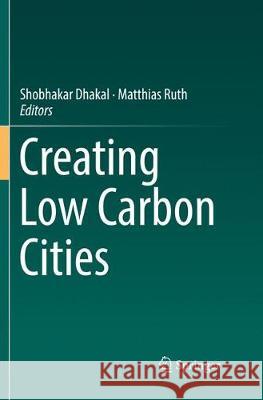Creating Low Carbon Cities » książka



Creating Low Carbon Cities
ISBN-13: 9783319842264 / Angielski / Miękka / 2018 / 205 str.
Creating Low Carbon Cities
ISBN-13: 9783319842264 / Angielski / Miękka / 2018 / 205 str.
(netto: 477,32 VAT: 5%)
Najniższa cena z 30 dni: 497,71 zł
ok. 20 dni roboczych.
Darmowa dostawa!
Chapter1. Challenges and opportunities for transition to low carbon cities.- Chapter2. Big data, people and low carbon cities.- Chapter3. Co-benefits and co-costs of climate action plans for low-carbon cities.- Chapter4. Optimizing Water-Energy-Carbon Nexus in Cities for Low Carbon Development.- Chapter5. Grassroots environmentalism and low-carbon cities.- Chapter6. Emerging low-carbon urban mega-projects.- Chapter7. Energy consumption and emissions assessment in cities: an overview.- Chapter8. Low carbon urban design: potentials and opportunities.- Chapter9. Low carbon cities: The Chinese experience.- Chapter10. Low-carbon urban infrastructure.- Chapter11. Low-carbon waste management.- Chapter12. Managing greenhouse gases emissions in cities: the role of inventories and mitigation actions planning.- Chapter13. Social factors affecting low carbon cities.- Chapter14. Key drivers and trends of urban greenhouse gas emissions.- Chapter15. Potential transformation pathways towards low carbon cities: the big picture.- Chapter16. Eco-Districts as a transition pathway to low-carbon cities.
This book addresses key topics in the current deliberations and debates on low carbon cities that are underway globally. Contributions by experts from around the world focus on the key factors required for creating low carbon cities. These include appropriate infrastructure, ensuring co-benefits of climate actions, making best use of knowledge and information, proper accounting of emissions, and social factors such as behavioral change. Readers will gain a better understanding of these drivers and explore potential transformation pathways for cities.
Particular emphasis is given to the current situation of energy consumption and greenhouse gas (GHG) emissions at the urban level, stressing the complexity of measuring GHG emissions from cities. Chapters also shed new light on the long-term transformation pathways towards low carbon. This book discusses key challenges and opportunities in all these domains to aid in creating low carbon cities, making it of value to policy makers, researchers in academia and consultants working on climate change and energy issues.
“The low carbon cities agenda is of bold ambition and demands rapid societal transformation. This book provides invaluable information and analysis on how the goals of this agenda can be achieved and what will be the significant obstacles in the way. The content in the book goes below the surface to reveal on-the-ground economic, engineering and equity issues that are at the heart of the Paris Climate Agreement and the ensuing policy debates. In this way, Creating Low Carbon Cities serves as a critical scholarly benchmark and as a toolkit for further action."
William Solecki, Professor, Institute for Sustainable Cities, City University of New York
"Creating Low Carbon Cities provides a refreshingly critical approach to low-carbon urban development, what has been achieved so far and the challenges ahead. It will be an important data-driven resource for local leaders, sustainability practitioners and urban planners.”
Ms. Monika Zimmermann, Deputy Secretary General, ICLEI—Local Governments for Sustainability
1997-2025 DolnySlask.com Agencja Internetowa
KrainaKsiazek.PL - Księgarnia Internetowa









